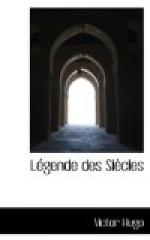Une sinistre main sortait de l’infini.
Vers la trompette, effroi de tout crime
impuni,
Qui doit faire a la mort un jour lever
la tete,
Elle pendait enorme, ouverte, et comme
prete
A saisir ce clairon qui se tait dans la
nuit,
Et qu’emplit le sommeil formidable
du bruit.
La main, dans la nuee et hors de l’Invisible,
S’allongeait A quel etre etait-elle?
Impossible
De le dire, en ce morne et brumeux firmament.
L’oeil dans l’obscurite ne
voyait clairement
Que les cinq doigts beants de cette main
terrible;
Tant l’etre, quel qu’il fut,
debout dans l’ombre horrible,
—Sans doute, quelque archange
ou quelque seraphin
Immobile, attendant le signe de la fin,—
Plongeait profondement, sous les tenebreux
voiles,
Du pied dans les enfers, du front dans
les etoiles!
FIN
NOTES
LA CONSCIENCE.
It has been thought that the subject of this poem was suggested to Victor Hugo by a passage in Les tragiques, a satirical poem in seven books, depicting the misfortunes and vices of France, written by Theodore Agrippa D’Aubigne (1551-1630), whom Sainte-Beuve calls the Juvenal of the sixteenth century. The passage relating to Cain occurs in the sixth book, called Les Vengeances. The following extracts indicate the spirit in which the author dealt with his theme.
Il avoit peur de tout, et il avoit peur de lui . . . . . . . La mort ne put avoir de mort pour recompense: L’Enfer n’eut point de morts a punir cette offense; Mais autant de jours il sentit de trespas: Vif, il ne vescut point; mort, il ne mourut pas. Il fuit d’effroi transi, trouble, tremblant et blesme, Il fuit de tout le monde, il s’enfuit de soy-mesme . . . . . . . Il possedoit le monde et non une asseurance; Il estoit seul partout, hors mis sa conscience, Et fut marque au front affin qu’en s’enfuiant Aucun n’osast tuer ses maux en le tuant.
It is clear that if the poem suggested the subject to Hugo it suggested nothing else.
With Cain may be compared Le Parricide, one of the 1859 series, which is also inspired by the theme of the guilty conscience pursuing the murderer. In this case remorse is symbolized by a drop of blood which falls upon the head of the criminal wherever he goes.
Assur, English Asshur; the name occurs in the marginal rendering of Gen. x. II (Revised Version).
The names of persons and their descriptions are taken from the account of Cain’s descendants in Gen. iv. 17-23.
Jabel, English Jabal, son of Lamech, a descendant of Cain and Adah. ‘He was the father of such as dwell in tents and have cattle.’
Tsilla, English Zillah, one of Lamech’s wives.
Jubal, the brother of Jabal. ’He was the father of all such a handle the harp and pipe.’




